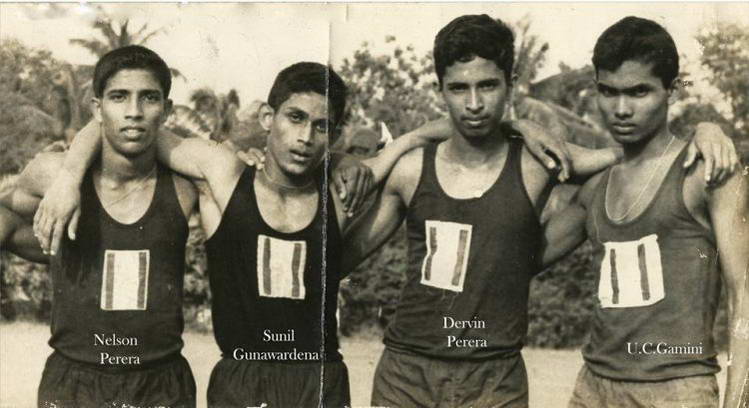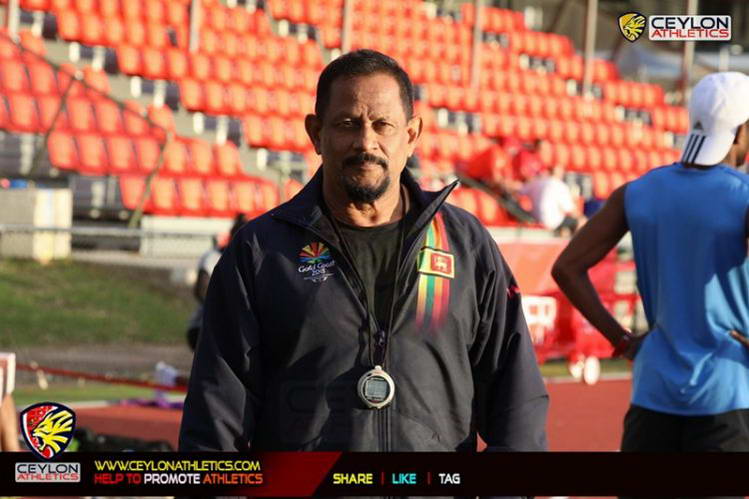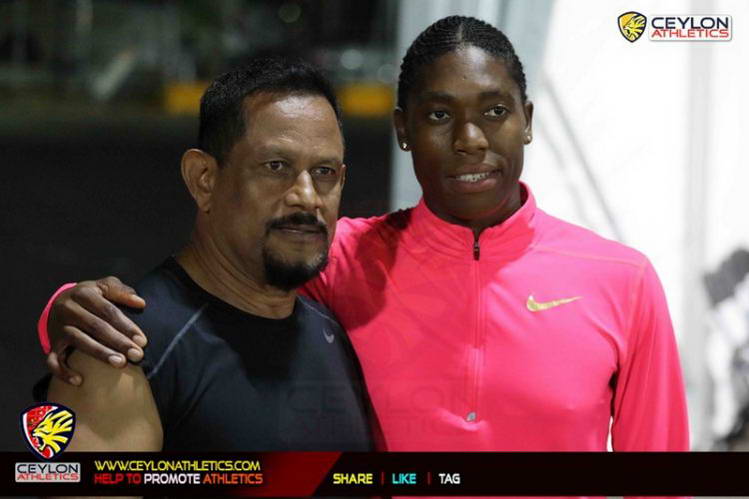Sunil Gunawardena appointed as National Coach
Former Olympian turned Veteran coach, Sunil Gunawardene was appointed as National Coach by the Athletics Association of Sri Lanka (AASL). Gunawardene, one of the most experienced active coaches in Sri Lanka had a instrumental career so far both as a athlete and a coach as he had produced many top-notch athletes such as Damayanthi Darsha, Mahesh Perera, Nayanthi Kumari, Rohan Pradeep Kumara, Rohitha Pushpakumara, Prasanna Amarasekara in the past .
Also he had not lost his grip in with youngsters too as young sprinters like Shelinda Jansen and Sadeepa Henderson already dazzling in International Junior athletics arena where Jansen already has international junior medals for her name.
Recently he was instrumental in the fight against usage of illegal performance-enhancing drugs in Sri Lanka where he was active and vocal against alleged distributors of banned substances. Gunawardene has served at several top positions in athletics prior to this ,including the post of president of the athletics association.
Wants to know More about him ? Read below ….
Dubbed as Josage Yaksha Patiya, Sunil B. Gunawardena was born on 6 October 1949 in Chilaw. He was notoriously active and stubborn to the extent that his parents questioned his state of mental health. He entered athletics unexpectedly at the age of 17. Sunil was helping out the district champion with his training, but he accidentally outran the champion while training and that’s when he discovered that he could run.
Gunawardena goes into history as the first schoolboy to break the 11 second barrier in a 100m event. After claiming all the school records Sunil was determined to break all national records and on his 21st birthday he achieved his dream when he broke the 100m and the 200m record which was unbroken for over 20 years.
The determined youngster was the youngest of the Sri Lankan contingent that took part in the 1972 Olympics. He didn’t have much success in the 100m event, but in the 200m he advanced to the quarter-final recording a time of 21.31s, the best among the Asians at the time.At the Teheran Asian Games the 4×400 relay team, which included Sunil, was able to win Gold with a time of 3 minutes 7.40 seconds, which remained the Asian Games record for 12 years and the best performance by a Sri Lankan relay team in the Asian Games till today.He retired in 1978 after 10 years in the athletics field. Sunil was lucky enough to marry the love of his life, K.G Badra, who was also a national athletic champion.
The duo, Sunil and Badra, need no introduction and together, for 40 years, they have been coaching many kids who would win at international level.Moving into coaching after 1978 Sunil was instrumental in producing many outstanding athletes. No other coach has produced medal winning athletes like him
At 69, Sunil Gunawardena is a fighter. He fought and won against cancer and is still fighting to make sports clean by eliminating the use of drugs and banned substances in athletics.This gentleman likes to talk about the success and achievements of others more than his own and seeing his children perform well gives him immense happiness.
Describe your childhood?
I was born in Bandarawatta, Kakkapalliya, Chilaw on 6 October 1949 to Joseph Gunawardena and Harriet Exceda. I was the second in a family of 6 children: 1 elder brother, 2 younger brothers and 2 elder sisters. My alma mater is St Mary’s College, Chilaw. I was a stubborn, notorious child who would get things he wanted by hook or by crook. Tagged by the nickname ‘Josage Yaksha patiya’ I was a devil by nature. I was even taken by my parents to the Colombo General Hospital to find out if I had a psychological reason that made me this way.
How was Sunil the athlete born? What other sports did you play at school?
I didn’t know that I could run; not till I was 17 anyway. I was just messing around playing cricket back then. There was a boy in our school who won District Meets and was training to participate in the All Island Meet. In order for him to improve his timing he had voluntary runners – a few students who ran with him. I was requested to volunteer one day and the District champion couldn’t outrun me at any point. Our Math’s master witnessed this and requested me to race against him. Much to the surprise of everyone I was able to defeat the ‘Wayamba District champion’ and that’s the day I realized my talent in running and that I was the fastest in the Wayamba District. Sunil Gunawardana, the Olympic runner was born very unexpectedly.

When did you take up athletics seriously?
Seeing how I performed in the practice session, my Math’s master took me to Colombo and I took part in the National Relay Carnival where I won in 4*100, 4*200 and 4*400. I was able to clinch Gold in my very first individual event at the public school meet. I won the long jump, the 100m and the 200m events. My timing in the 100m happened to be 10.9 seconds and I didn’t know until I saw the newspapers next day that the headline said I was the ‘First ever schoolboy to break the 11 second barrier’. For the 200m event the newspapers published: ‘Sunil equals Milkha’s all-comers 200m mark’. All this happened in 1968 and this was the year that I started training for athletics seriously.
How were your performances at the national level?
After breaking all the school records my main motive was to break the Sri Lankan records. There was a selection meet on my 21st birthday and I was determined to break the records then. As anticipated I was able to beat the 100m national record of 10.8 seconds by running 10.5 seconds. This record was unbroken for 25 years. I was also able to break the 200m record which remained unbroken for 22 years. At national level, I was consistently among the first three in my respective events from 1968 to 1978.
How did you qualify for the Olympics? Did you attend any overseas training?
In 1971, I was lucky enough to be selected for a scholarship to West Germany along with 16 other Asians to study sports science and to train. I did well there and I was informed that I could take part in the 1972 Olympics. But much to my surprise I was asked to run in international meets and face pre-qualifying trials after I returned home. The target given to me in the 100m event was 10.5s. In the first trial I recorded a 10.8, and in the second it was 10.7. I didn’t have any competition from others and that was the main reason I couldn’t achieve the target. I thought of a way to get the timing to 10.5 and requested the officials to ask other competitors to start the race a few meters ahead of me so that I would have to run faster to beat them. They agreed and in the third trial I achieved a 10.4 and qualified. I went to Germany again, in 1972 to train before the Olympics for another three months.
How was your experience at the 1972 Munich Olympics?
The experience was very glamorous and I met many champion sports personalities. I was never scared of the Games or the crowd; the bigger the crowd the better it was for me. I didn’t do well in the 100m event. I was knocked out in the first round as I only recorded a time of 11.00s, but in the 200m event I was able to advance to the quarter-finals as I registered a timing of 21.31s, which was the fastest timing by an Asian at the time.
What is your proudest achievement in your sporting career?
I would rate winning the 4*400 meters relay at the 1974 Teheran Asian Games the proudest, even better than participating in the Olympics. This was a special race for me since I registered for the 200m individual event as well. Both these events clashed and I had to select one so I decided to take part in the relay and my decision proved to be excellent since we won the Gold with an Asian record breaking time of 3:07.40. I ran the 200m event at 21.3s in the Olympics and the athlete who won the 200m event at the 1974 Asian Games recorded a timing of 21.4s. Had I taken part in it I would have had the chance of becoming the first. But I have no regrets, since this was a team event and I was able to contribute to win, and the fact that this Asian record was with us for 12 years. The fact that no other Sri Lankan relay team has won a Gold medal at the Asian Games to date makes this extra special.
You and K.G. Badra were regarded as the King and Queen of the athletics field. Why did the talented duo retire from the sport right after marriage?
Our love story runs back to 1970. In 1970 Badra and I were the fastest man and woman in the field. We were at a Meet in Thailand and I called Badra’s room and said ‘Badra, we are the fastest runners in Sri Lanka.
Imagine if we marry, how fast would our kid run?’ That was my epic proposal. She was also selected for the Olympics along with me but unfortunately she got appendicitis and couldn’t participate. We got married in 1978 and it was the same year that I decided to hang up my running shoes. 10 years of running, winning National meets, Asian Games and participating in Olympics, I was more than happy to bid farewell to athletics at the age of 29. One main reason was the marriage and the other was that we both ruled the tracks and it was becoming boring due to the lack of competition. Unfortunately we were not blessed with a child, but the 1000’s of kids we have trained have wiped away our tears and brought us joy with their victories.
Were you involved in coaching and sports administration after retirement? What was your career since then?
From 1978 to date I have been involved in administration and have been training the athletes gratis most of the time. I have many international coaching diplomas. I also travelled to experience how famous athletes like Cathy Freeman, Carl Lewis and Usain Bolt trained. This gave me a lot of insight as to what tactics I should use as a coach.
From 1971 to 1978 I worked at the Ceylon transport Board and after I retired from work as I did from athletics, I moved into administrative duties and held the titles of National Athletics Pool Coach (1991), Coordinating Secretary to the Minister of Sports (1994), Vice President of Sri Lanka Athletic Association (1996), President of Sri Lanka Athletic Association (2000), Director General of Sports and Physical Education of Sri Lanka Universities (2011) and Coordinating Secretary to the Minister of Rural Development Affairs (2015).
Are you happy about the direction athletics is heading?
To be honest with you Vimukthi, we have got the best junior team who can do wonders in future, but I am very scared about the spread of banned substances and drugs which can ruin even the most successful careers. We need to produce athletes who have a natural ability and who can run with their mental strength.
What changes need to be done in the field for better days ahead?
We need resources; the main thing being more synthetic tracks mostly in the rural areas as a mode of promoting and developing the sport. We need to have more gyms for athletes to engage in weight training. I also don’t recommend the use of supplements. Authorities need to identify the sports that would bring more credit to the country and invest more in them.
Who is Sunil now?
Someone who has been away from the grounds for four to five months mainly due to the use of banned substances and drugs in athletics. A fighter who fought cancer and won with the help of a robotic operation and a fighter who is fighting to stop the usage of drugs in sport and who has now returned back to coaching.
(Interview by Vimukthi Adithya)







